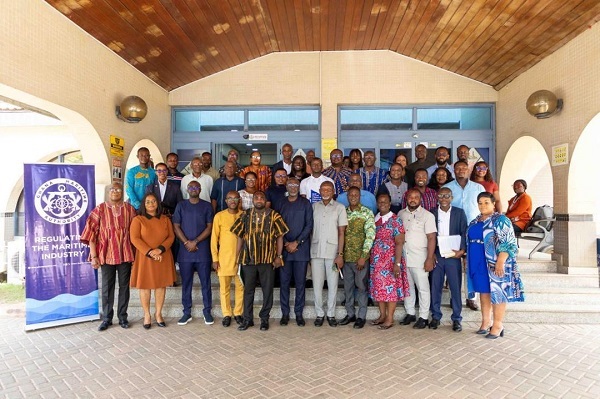
2 Bodies sign MoU to improve working conditions of fishers
THE Ghana Industrial Trawlers Association (GITA) and the National Union of Seamen, Port and Allied Workers (NUSPAW) have signed a Memorandum of Understanding (MoU) to improve the working conditions of fishers on trawl vessels operating in the country.
The wage agreement is an outcome of collaborations that began in 2017, continuing through the Ghana Maritime Authority (GMA) led Tripartite Committee on Work in Fishing, which comprises the GMA, the Labour Department, the Fisheries Commission (FC), and other stakeholders in the fisheries sector.
For years, fishers working on industrial trawlers in Ghana have operated under precarious and mostly informal arrangements, such as low or irregular pay, which left them vulnerable to exploitation.
Additionally, access to grievance mechanisms was limited, and conditions on board often failed to meet basic occupational health and safety standards.
The agreement, which marks a pivotal point in the sector, moves towards international labour standards for fishers to ensure transparency, fairness and the elimination of abusive practices, applies to all industrial trawl vessel owners, operators, and agents under GITA's purview.
Key components of the one-year agreement include an increase in basic salary of 75 per cent across the board, an increase in the fixed rate for tonnage catch-25kgs of chop fish at all levels, and the payment of fishers through bank accounts, along with the provision of pay slips detailing earnings and deductions.
The General Secretary of NUSPAW, Michael Angmor, and a representative from GITA, Kate Ansah, signed on behalf of their respective institutions.
Labour standards
At the signing ceremony in Accra last Wednesday, the Director-General of GMA, Dr Kamal Deen Ali, said the agreement demonstrated Ghana's commitment to international maritime labour standards, particularly following the country’s ratification of the ILO Work in Fishing Convention, 2007 (C188).
“It is important to note that Ghana, having ratified the ILO Work in Fishing Convention, 2007 (C188), is under an obligation to ensure that fishers work under conditions of safety, dignity and fairness. The signing of this MoU is, therefore, a major achievement and a clear step towards improving the working and living conditions of fishers on trawl vessels operating in Ghana,” he said.
He affirmed the authority’s commitment to implementing the agreement effectively in collaboration with the Fisheries Commission and the Labour Department.
Persistent advocacy
Mr Anganu expressed appreciation to all stakeholders who played a role in bringing the agreement to execution, saying: “The MoU represents eight years of persistent advocacy and negotiation. It is a victory not only for our union but, more importantly, for the fishers who have endured long-standing injustices.”
“NUSPAW can see an industry "wholly owned and operated by Ghanaians". To this end, we believe, Partners in the Fishing Industry must work together, such that the tripartite constituents see themselves as partners, and not competitors or opposing each other.
“On this note, even though there are challenges with the current arrangements at the trawls sector, we appreciate our partnership with, and the commitment of GITA, which partnership and commitment bonds us stronger together than any challenge and, therefore, we are able to address them,” he stated.
For her part, Ms Ansah said the agreement demonstrated their collective will to uplift the dignity, welfare, and rights of the hardworking fishers.